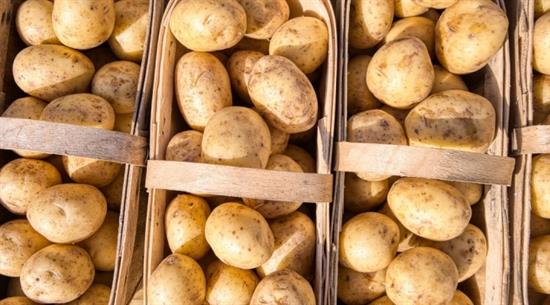Press Releases
Pingree Leads Bipartisan Opposition to USDA Reclassification of Potatoes
Washington,
April 11, 2024
Tags:
Food and Agriculture
Amid concerning reports that potatoes could be reclassified as grains in the Dietary Guidelines for Americans (DGAs), Congresswoman Chellie Pingree (D-Maine), a member of the House Agriculture Committee, and Congressman Mike Simpson (R-Idaho) are leading a bipartisan effort to express opposition to efforts to declassify potatoes as vegetables. In a letter to U.S. Department of Agriculture (USDA) Secretary Thomas Vilsack and U.S. Department of Health & Human Services (DHHS) Secretary Xavier Becerra, Pingree, Simpson, and 27 Members of Congress voiced their strong opposition to any reclassification of potatoes, which they say would “call the scientific credibility of the entire process into question.” “Since the inception of the U.S. Department of Agriculture (USDA), it has classified potatoes correctly as a vegetable. There is no debate about the physical characteristics of the potato and its horticultural scientific classification,” the Members wrote. “Given the nutritional value of potatoes, consumers would be missing out on key nutrients if a reclassification effort, or even a suggestion that grains and potatoes are similar and thus interchangeable, moves forward through the DGAs process,” the lawmakers continued. “In addition, any change to potatoes’ current classification under the DGAs would immediately confuse consumers, retailers, restaurant operators, growers and indeed the entire supply chain.” Pingree, Simpson, and the Members called attention to a 2013 National Library of Medicine study, which found that “potatoes should be included in the vegetable group because they contribute critical nutrients,” and “All white vegetables, including white potatoes, provide nutrients needed in the diet and deserve a prominent position in food guides.” “Reclassifying potatoes as a grain would defy the scientific assertion made by the National Library of Medicine study,” the Members said. The full letter is copied below and available online here. In addition to Pingree and Simpson, the letter was signed by House Agriculture Committee Chair Glenn “G.T.” Thompson (R-Pa.), and Representatives Jared Golden (D-Maine), Shri Thanedar (D-Mich.), Dan Meuser (R-Pa.), Tom Tiffany (R-Wisc.), Elissa Slotkin (D-Mich.), Cathy McMorris Rodgers (R-Wash.), Jack Bergman (R-Mich.), Dan Newhouse (R-Wash.), Kelly Armstrong (R-N.D.), Scott Fitzgerald (R-Wisc.), Derrick Van Orden (R-Wisc.), Lisa C. McClain (R-Mich.), John R. Moolenaar (R-Mich.), Mike Gallagher (R-Wisc.), Bill Huizenga (R-Mich.), Russ Fulcher (R-Idaho), Kim Schrier (D-Wash.), Lori Chavez-DeRemer (R-Ore.), Marcus Molinaro (R-N.Y.), Claudia Tenney (R-N.Y.), Andrea Salinas (D-Ore.), Cliff Bentz (R-Ore.), Dan Kildee (D-Mich.), Rashida Tlaib (D-Mich.), Rick Larsen (D-Wash.), and Suzan DelBene (D-Wash). Pingree is a longtime organic farmer and serves on both the House Agriculture Committee and House Appropriations Agriculture Subcommittee. She has been a strong advocate for supporting access to fresh potatoes. In 2013, Pingree and Simpson pushed for an amendment to the Fiscal year (FY) 2014 appropriations bill to ensure WIC recipients had access to fresh potatoes. Pingree has also highlighted the value of potatoes in school meals. +++ Dear Secretary Vilsack and Secretary Becerra: We write regarding recent press reports concerning the development process of the Dietary Guidelines for Americans (DGAs) (2025-2030), specifically the possible reclassification of potatoes as a grain, instead of a vegetable. Given the lack of a scientific justification behind the assertion that potatoes are not vegetables, and the documented nutritional benefits of potatoes, we strongly oppose any reclassification of potatoes to the grain category under the DGAs. Since the inception of the U.S. Department of Agriculture (USDA), it has classified potatoes correctly as a vegetable. There is no debate about the physical characteristics of the potato and its horticultural scientific classification. Unlike grains, white potatoes are strong contributors of potassium, calcium, vitamin C, vitamin B6, and fiber. A medium baked potato contains 15 percent of the daily recommended value of dietary fiber, 27 percent of the daily recommended value for vitamin B6, and 28 percent of the daily recommended value of vitamin C. In fact, potatoes have more potassium than bananas, a food that is commonly associated with being high in potassium. Given the nutritional value of potatoes, consumers would be missing out on key nutrients if a reclassification effort, or even a suggestion that grains and potatoes are similar and thus interchangeable, moves forward through the DGAs process. In addition, any change to potatoes’ current classification under the DGAs would immediately confuse consumers, retailers, restaurant operators, growers and indeed the entire supply chain. That is one of the reasons that the trade groups of both sides of this classification debate—the National Potato Council and the Grain Chain—have filed comments in opposition to potatoes being defined as anything other than a vegetable. In addition, our federal nutrition programs rely on the DGAs to ensure that program beneficiaries are receiving well-balanced, nutritious food. Such a change could also come at a cost to our nation’s schools, as under the National School Breakfast and National School Lunch Programs, schools already struggle to meet vegetable consumption recommendations at a reasonable cost, and potatoes are often the most affordable vegetable. Finally, classifying potatoes as a grain instead of a vegetable would also go against a 2013 National Library of Medicine Study titled White Potatoes, Human Health, and Dietary Guidance. This study found that … potatoes should be included in the vegetable group because they contribute critical nutrients. All white vegetables, including white potatoes, provide nutrients needed in the diet and deserve a prominent position in food guides. Reclassifying potatoes as a grain would defy the scientific assertion made by the National Library of Medicine study. We strongly urge you to avoid reclassifying potatoes as a grain or allowing substitution between potatoes and grains, as this action would call the scientific credibility of the entire process into question. Given the rapid timeline that the DGAs are on, we ask that you provide us an update on this issue as soon as possible. Sincerely,
### |


